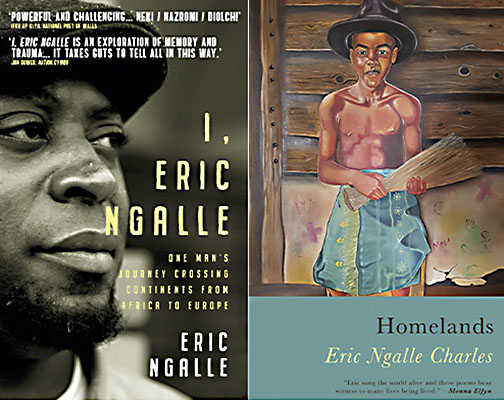Mosre Mo Ngwa was born in Beau in Cameroon and could not have imagined the life that lay ahead that brought him to Wales. As a child, life was simple. Brought up on his mother’s farm, it was school, home, and food. “Life was so simple, it was wonderful, it was heavenly” says the man now known as Eric Ngalle Charles, poet, author, and playwright.
“My mother was a lone parent and played the part of both parents for 6 children. As a writer I keep going back to these memories as inspiration”. Life changed at the age of 17 years old. Throughout his former years he noticed that people’s rights and freedoms were becoming restricted. Political and economic power lay with the French speaking community and while in university in 1996 he was writing political articles supporting the Cameroon Anglophone Movement (CAM). A
major pressure organisation.
At the time streets were full of gang conflict. People were killed during frequent riots in horrendous fashion in broad daylight. Necklacing, when tyres were forced onto victims and were burned alive on the streets was common but there was also family turmoil. After family inheritance issues, Eric and his mother were shunned and publicly humiliated and in 1997 he was attacked then arrested. His father’s family were now seen as the enemy and he knew he had to escape. He spent just 3 days in prison but when he was free he knew the only option was to leave Cameroon. If he had stayed he feels because of what his father’s family had done to him he was ready to burn down his fathers house with everybody that was in it. He knew if he had stayed he would not be in the position he is in now.
When Eric left he thought he was travelling on a student visa to Belgium to study economics but on the stopover in Malta he was told his visa didn’t allow him to transit to Belgium and he had to travel to Moscow. After arriving in Russia he was immersed into the underworld. He spent time in cells seeing the money laundering, and people
trafficking surrounded every aspect of his new life. The black faces were all victims of trafficking. “We were the prey, and they were preying on us. I was broke and had nowhere to go” he explains. There was a system and from the airport he was taken to central Russia and ended up in Stavropol. “I felt as if I was dead, and I engaged in all sorts. It was
inconsequential what happened to me. The longer I stayed in Russia, the more venom I developed”. “He added “In my mind I wanted to go home to ask my father what I
had done to make them hate me. In 1997 I was dead”.
He spent two years and two months living on Russian streets buying and selling fake dollars, dancing as a stripper through towns and
cities from Stravropol and finally ending up back in Moscow. He was rejected his citizenship in the Cameroonian Embassy. They claimed he was not from Cameroon as he spoke French with a heavy accent. He was told to go to the Nigerian High Commissioner. “I was going to be repatriated to Cameroon through a UN programme as my Russian language was so good they thought I had lived there for more than 10 years but one week before I was due to fly back to Cameroon the programme was stopped. I bought a Zimbabwean passport on the black market and managed to get out of Russia”.
“The whole experience was traumatic. I will never go back to that but there was something bigger than me protecting me otherwise I would not have survived” he said. “The consequences could have been tragic. Dealing in fake dollars, torture to the point of death. I would not have survived but there was something bigger”. He arrived in the UK in 1999 and knew his destination was Cardiff by National Express bus. A friend, Francis Elive, from the same village as Eric had left Cameroon to teach in the Welsh Capital.
“When I arrived at Heathrow I saw a bus going to Swansea via Cardiff. When I arrived at Stand A in Cardiff I saw a black guy and went over to him and asked, ‘excuse me do you know a Cameroonian called Francis?’. He looked at me as if I was mad”. Then I saw a man dressed in African costume so I asked the same question. He laughed
and spoke in French. He was from Rwanda.
By coincidence Emanuel had been helped by Cameroonians during his escape from Rwanda. He wanted to return the favour and welcomed Eric to his home. Eric did find Francis Elive and after appeal was granted full refugee status. Making a new life in Cardiff Eric was asked by Peter Finch, head of the Welsh Academy ( now Literature Wales ) to speak at a literature and trauma event in Llandudno in 2001 about his journey to Wales.
“I was frightened. I didn’t know what part of my life people wanted to listen too. The memory of a young man growing up on the streets of Buea, or the memory of two years and two months in Russia or the travels of a 64 year old ‘Zimbabwean’ to Cardiff. There was a lady from Afganastan at the event telling her story of the journey her family endured via Uzbekistan, Istanbul into Turkey. Her father passed away in Uzbekistan and human traffickers took it in turns to do what they wanted with her mother so they could
secure their passage to Istanbul. She was talking of this trauma on stage and Eric was thinking “Oh my God, I thought I had it bad but seeing her tell her story was courageous and she became my inspiration”.
“I still hadn’t found my voice and on returning to Swansea through the mountains and sheep along the A470 I wrote my first poem. ‘On a wet journey to Llandudno, Washing away pain and longing, A reborn voice crying, Between a mountain and a sea’. He had found a voice and Between a Mountain and a Sea became the title of Eric’s first poetry anthology published by Hafan Books in 2003.
Eric also found the skills of storytelling in his youth especially with his deep gentle voiced delivery. His personality captivated his audience keeping them transfixed to his every word. He grew up telling stories to his grandfathers many children. To keep his mind away from the hunger he would visit his grandfather after school and entertain the children in his grandfather’s compound. One of the mothers would cook and he would be fed. He found that moving to the next compound and telling the children there more stories he would get more food. “When I got home if my mother had not prepared food I didn’t mind” says Eric.
Despite the hardship he looks back fondly on his childhood. In his latest book ‘Homelands’ published by Seren Books in 2022 he returns to the memories of growing up. He says, “these memories are my fuel and are extremely important for writers”. Eric started a family in Cardiff with wife Debra, who he is now separated, his step-daughter Nicole and his own daughter Jolie. He currently balances his PhD research and a job with Amazon.
It was 20 years on before Eric returned to Cameroon. It proved to be a traumatic return. “It was the horror of what had happened to me, I thought I had dealt
with it but as soon as I arrived those dark memories of 1997 returned. So strong I couldn’t go back to my village. I had to stay an hour away. Where I should have felt a welcome I felt the nightmare of the past” he remembers. Again, he used the trauma to create and help others. He started creative writing workshops at the Dylan Thomas Centre in Swansea until 2020. He was interested in creating partnerships between creatives in Wales and Cameroon using the relationship between literature and trauma.
He realised from the day he arrived in Wales that the only person to tell his story was Eric Ngale. He say’s ”Sometimes, your voice can easily be lost under labels. By this, I mean instead of you being able to tell your story you become part of the collective narrative. I work with asylum seekers, refugees and victims of human trafficking. By giving these people a voice, I found my own voice”.
In 2017 Eric was awarded the Creative Wales Award by the Arts Council of Wales for his work in migration, memory and trauma. Eric continued “People sometimes arrive in a country but never actually arrive. Some leave their country but never actually leave. So your mind is in one place but your body in another”. He tells the story of a migrant being kicked out of a coffee shop in the centre of Cardiff for sitting but not buying a coffee. In his country they have an open house to drink coffee. In his head he was in his homeland not in central Cardiff. The scent of coffee took him back to his home and back again.
In 2019 Eric’s autobiography was published by Panthian Books. “I had to write this to flush everything out of my system before I could
move on. I came and people wanted to hear my story, but what part, so I Eric Ngalle was redeeming my name. He has since studied modern history and popular culture at Cardiff Metropolitan University. He has been featured at The Hay Festival and the BBC, earned a place to start an MA in creative writing at Cardiff University and is currently a PhD researcher at Kings College London.
“ I thought about giving up many times” he say’s “but my story is something I share with the world. I am not in despair anymore. I think of the Afgan. lady in Llandudno and realise there are many people who have had it so bad but if we can do it then you can do it better”.
Eric’s story as told to South Wales Echo/Reach





